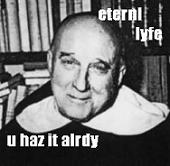DECRETUM DE OECUMENISMO
UNITATIS REDINTEGRATIO
§16 Praeterea a primis iam temporibus Ecclesiae Orientis disciplinas proprias a Sanctis Patribus atque Synodis, etiam Oecumenicis, sancitas sequebantur. Cum autem unitati Ecclesiae minime obstet, immo decorem eius augeat et ad missionem eius implendam non parum conferat quaedam morum consuetudinumque diversitas, uti supra memoratur, Sacra Synodus, ad omne dubium tollendum, declarat Ecclesias Orientis, memores necessariae unitatis totius Ecclesiae, facultatem habere se secundum proprias disciplinas regendi, utpote indoli suorum fidelium magis congruas atque bono animorum consulendo aptiores. Perfecta huius traditionalis principii observantia, non semper quidem servata, ad ea pertinet quae ad unionem restaurandam tamquam praevia condicio omnino requiruntur.
§16. Already from the earliest times the Eastern Churches followed their own forms of ecclesiastical law and custom, which were sanctioned by the approval of the Fathers of the Church, of synods, and even of ecumenical councils. Far from being an obstacle to the Church’s unity, a certain diversity of customs and observances only adds to her splendor, and is of great help in carrying out her mission, as has already been stated. To remove, then, all shadow of doubt, this holy Council solemnly declares that the Churches of the East, while remembering the necessary unity of the whole Church, have the power to govern themselves according to the disciplines proper to them, since these are better suited to the character of their faithful, and more for the good of their souls. The perfect observance of this traditional principle not always indeed carried out in practice, is one of the essential prerequisites for any restoration of unity.
EPISTULA APOSTOLICA
EUNTES IN MUNDUM
§10 … Ex hoc Decreto eruitur dilucide autonomiam, qua quoad disciplinam Ecclesiae Orientales fruuntur, non manare e privilegiis ab Ecclesia Romana concessis, sed a lege ipsa, quam huiusmodi Ecclesiae a temporibus apostolicis tenent.
§10 ….From the Decree there clearly emerges the characteristic disciplinary autonomy, which the Eastern Churches enjoy; this is not the result of privileges granted by the Church of Rome, but of the law itself which those Churches have possessed since Apostolic times.
The term Roman Catholic is rather confusing. It creates a certain degree of misunderstanding. In the English speaking world it was invented by Protestant Elizabethans when they were trying not to be too aggressive in their references to the Faithful but were nevertheless unwilling to concede the unqualified use of the term Catholic to them. Accordingly Catholics refused to use it of themselves. It seems the approach of the Faithful softened a little when the prospect of emancipation was dangled in front of them but then they hardened again in the Second Spring. The difficulty came with the insistence of officialdom upon the use of the ‘Roman Catholic’ expression.
The 1912 Catholic Encyclopaedia defines the term rather well, “A qualification of the name Catholic commonly used in English-speaking countries by those unwilling to recognize the claims of the One True Church.” It notes that in 1901 the English Hierarchy found they would not be permitted to address Edward VII on his accession unless they accepted the label. Cardinal Vaughan finally agreed so long as it was understood that he would clarify its meaning in a later public statement.
He made this statement in speech given at Newcastle upon Tyne that September where he told the Faithful,
“I would now say to you all, use the term ‘Roman Catholic’. Claim it: defend it: be proud of it; but in the true and Catholic sense. As the African Fathers wrote some fourteen centuries ago, ‘To be Roman is to be Catholic, and to be Catholic is to be Roman’. But I would also say, Like your English forefathers and your brethren on the Continent, call yourselves habitually and especially when the word ‘Roman’ is misunderstood simply Catholics, members of the Catholic Church.”
The problem is the use of the term ‘Roman’ as a specific difference as if there were other Catholics than those in communion with Rome. This problem is magnified outside (and now to an extent inside) the English speaking world by the Empress Maria Teresa’s invention of the term ‘Greek Catholic’ to describe Catholics of the Byzantine Rite. This causes enormous confusion. The term is inoffensive in itself although the increasingly popular ‘Byzantine Catholic’ is perhaps better (resolving the difficulty of the Greek Greek Catholic Church and of Greek Catholics who are not Greek Catholics). The problem is the tendency it creates of using the term ‘Roman Catholics’ to describe Catholics of the Roman Rite which then reintroduces the sense that ‘Roman’ names a sub-group and is not a universal quality of all Catholics.
The absurdity is put into relief by the fact that the pre-1453 (or pre-1261) Byzantines themselves insisted that they were Romans and scorned the term ‘Greek’ as equivalent to ‘Pagan’. Were one to accept the qualifier ‘Roman’ for Latin Catholics while respecting the claims to continuity of the Byzantines and Vaughan’s essential point that to be Catholic is to be Roman and to be Roman is to be Catholic, then a Byzantine Rite Catholic from Istanbul would be a Roman Greek Roman Catholic.
So….. the term Roman Catholic should not be used to describe Catholics of the Roman Rite as distinct from Catholics of the other Rites. A Catholic of the Roman Rite is a Roman Rite Catholic or a Latin Catholic. There is no such thing really as the Latin Rite (unless you mean the Gallican) as the Roman Rite was not originally in Latin nor when it was was it exclusively so. The term Greek Catholic is really not very helpful (but not a big problem so long as it isn’t contradistinguished from ‘Roman Catholic’). The term Byzantine Catholic is better. The term Roman Catholic should only ever be used in Cardinal Vaughan’s sense of Catholic simpliciter and with the caution he added that Catholic is almost always the better choice.
The BBC website is leading on the fact that Cardinal Carlo Martini gave an interview just before he died saying that the Church should get with the world and think a bit more (or a lot more) like the world. Wow! And… further shock…. lots of lapsed and liberal ‘Catholics’ agree with him. Errr even from an intra-Catholic perspective this isn’t news. How on earth does it end up as the lead story on the BBC website? The question is rhetorical of course. The world hates the Church because the Church is not of the world just as the world hated Jesus because He is not of the world. The world realises that the Church wishes to lead as many of the subjects of the world out of this world as she can before it is destroyed and that she does this through the Gospel and the Sacraments which perpetuate the power of the Cross. St Paul tells us that he did not preach the Gospel with persuasive words of worldly wisdom lest the Cross of Christ be emptied of its power. The world realises that the easiest way to frustrate the work of the Church and of Christ is to convince her children to embrace the wisdom of the world and preach that wisdom instead of the Gospel. They were rather hoping that a future Pope Martini would make this the official policy of the Holy See. He lost, and now they weep over his tomb. He who marries the spirit of the age is soon widowed.


